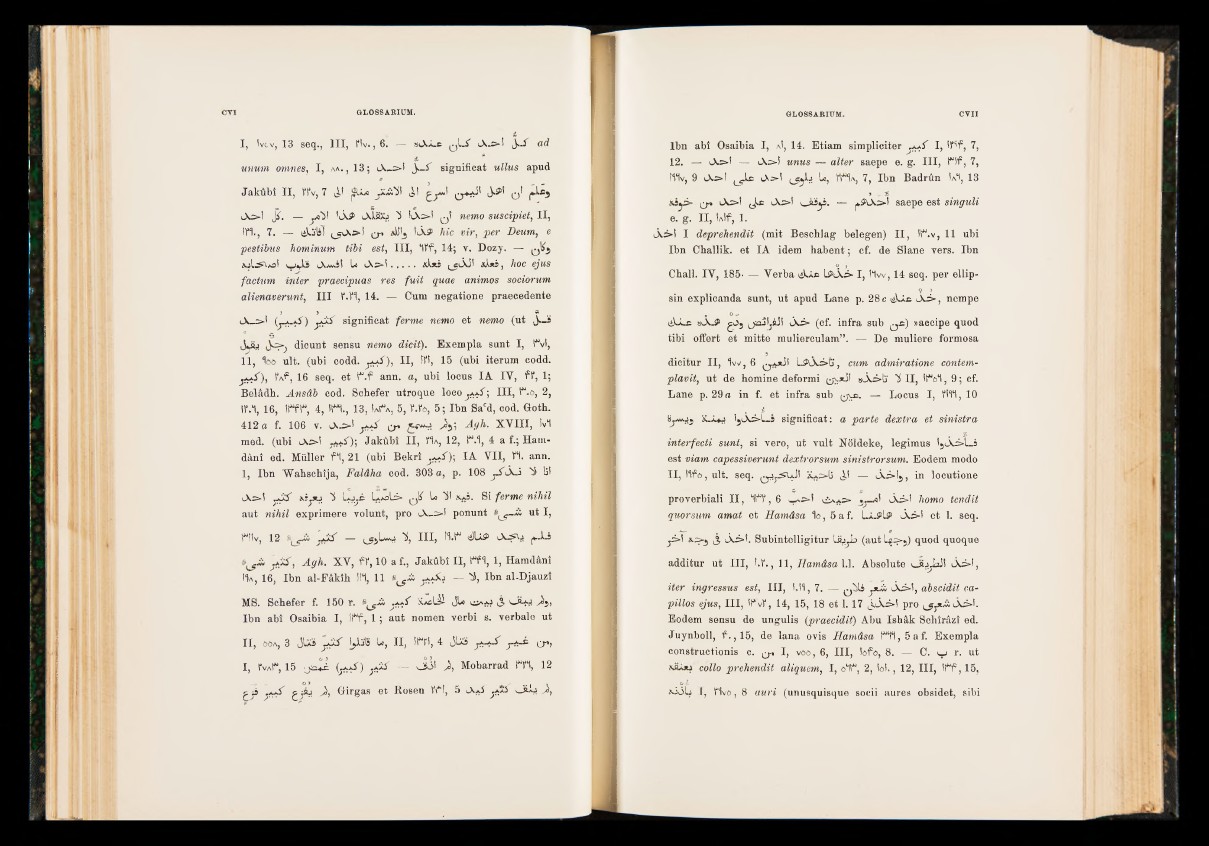
GLOSSAKIUM.
I, Ivcv, 13 seq., I l l , flv., 6. — »Ai-c qL-T’ A.j>I 3-2^
unum omnes, I , aa. , 13; A_s-l ÿ i ' significat ullus apud
J a k û b î I I , ffv, 7 3 ' yxLlI 3! q **)' ^ o '
Ae-I JJ. — y 1 l 'ÀS’ aISa,! 1 !A=>! q I Memo suscipiet, I I ,
I f l, 7. — Xi'lsl (0A5*! Gr Deum, e
pestibus hominum Ubi est. I I I , I f f , 14; v. Dozy. —
a3js\j>I 0jX î Aaaî! Lo Ae>1 làxi 0 iÂÜ jd*j, hoc ejus
facUim mter praecipuas res fuit quae animos sociorum
alienaverunt. I I I f.fl, 14. — Cum n eg a tio n e praecedente
3 3 5
A_e*I ( y - f ) f i A significat ferme nemo e t xiemo (u t f i
•Î
JjSj d icu n t sensu nemo dicit). Ex emp la su n t I, fivi,
I I , ioô u lt. (ubi codd. y f ) , I I , Ifl, 15 (ubi iterum codd.
y f , 'tef, 16 seq. et f i .f ann. a, ubi locus lA IV, f f , 1;
Belâdb. Ansâb cod. Scbefer utroque l o c o y y ; I I I , fi.o, 2,
lf.1, 16, r f f i , 4, i n . , 13, IaFa, 5, f.fo, 5 ; Ib n Sa'd, cod. Gotb.
412 o f. 106 V . A -> l y i Gr X V I I I , Iv1
med. (ubi A > l .aaS'); J a k û b î I I , TIa, 12, fi.l, 4 a f.; Hamdânî
ed. Müller f l , 21 (ubi Bek ri y i ) ' , lA VII, f l ann.
I, Ib n Wab scbîja , Falâha cod. 303 a, p. 108 f X J i L ljl
A* -l y i S . i y 1 Laj^é LajeLX y i Lo H S.A. Si ferme nihil
au t nihil exprimere volunt, pro A_:>! ponunt »y-XX u t I,
filiv, 12 '.A i — 0 iLvAj 1, I I I , ti.fi ii)lAS> A j ^ j y j
Agh. XV, f f , 10 a f., J a k û b î II , fifi, 1, Hamdânî
Ma, 16, Ib n a l-P âk îb 111, 11 » y l y i i — L , Ib n al-Djauzî
MS. Scbefer f. 150 r. * y l y i aacLÜ JLo câ^aj 3 o I a j f ,
Ib n abî Osaibia I, Ifif, 1 ; a u t nomen verbi s. verbale ut
I I , ÛOA, 3 3LaS y i y j'lj Lo, I I , Ifirl, 4 3L j y - jX ^.A.c gT)
I, fvAfi, 15 y l i ( y i ) f A - J j l >, Mobarrad f i f i , 12
^ j y f y y Jb, G i r g a s e t K o s e r i ffii, 5 A U y i o H j J ,
GLOSSARIUM. cvn
Ib n abî Osaibia I, a I, 14. Etiam simpliciter y i I, If^f, 7,
12. — A»-l — A > ! unus — alter saepe e. g. I l l , filf, 7,
Mlv, 9 A > l y c Ae-1 g 5 ^ B adrûn IaI, 13
Gr* lX,5>I y Ae>I v_àîjj. — j^ A s - l saepe est singuli
e. g. I I , Ulf, 1.
Â=>l I deprehendit (mit Beschlag belegen) I I , Ifi.v, 11 ubi
Ib n Cballik. e t lA idem h ab en t ; cf. de Slane vers. Ib n
Cball. IV , 185- — Verba X àc Lÿ>Âj-1, llw , 14 seq. p er ellipÛ
3
sin explicanda sunt, u t apud Lane p. 28 c X àe A i> , nempe
X a_e sA.S> g j j ^ a iljiJ i  i> (cf. in fra sub ^ e ) »accipe quod
tibi offert e t m itte mulierculam” . — De muliere formosa
dicitur I I , ivv, 6 ^ajoJI LO“A i- ( j, cum adxniratione contem-
plavit, u t de bomine deformi sAXlj 1 I I , Ifi'ol, 9 ; cf.
Lane p. 29 a in f. et infra sub i j y . — Locus I, fMI, 10
i
i i y z y K..À+J IjAê>L_5 significat ; a parte dextra et sinistra
s
interfecti sunt, si vero, u t v ult Nöldeke, legimus tjAXL-j
est viam capessiverunt dextrorsum sinistrorsum. Eodem modo
I I , Mfô, ult. seq. 0 jj.sy JI xaJ^L 3 ' — Ae>!j, in locutione
proverbial! I I , Ifif, 6 i^aae- ÂÊ>t homo tendit
quorsum amat ct Hamâsa io , 5 a f. L.À.ÿLÿ> Ai>l c t 1. seq.
y l K y 3 À X I. S u b in to llig itu r f f (aut L j> j) quod quoque
ad d itu r u t I I I , l.f ., 11, J/awÆsa 1.1. Absolute o i y j l A i- I ,
iter ingressus est. I I I , I.M, 7. ~ f i i yXx AÊ>I, abscidit ca-
pillos ejus. I I I , Ifivf, 14, 15, 18 e t 1. 17 3A i> ! pro (_5j*ë.Aê>I.
Eodem sensu de ungulis (praecidit) Abu Isb â k Schîrâzî ed.
Ju y n b o ll, f . , 15, de lan a ovis Hamâsa 1^11,5 a f. Exempla
constructionis c. gt* I; ''ü*, 6, I I I , iôfô, 8. — C. wj r. ut
collo prehendit aliquem, I, olfi, 2, IùI. , 12, I I I , ifif, 15,
O r.
*jJ>Lj I, f1vo, 8 auri (unusquisquo socii aures obsidet, sibi